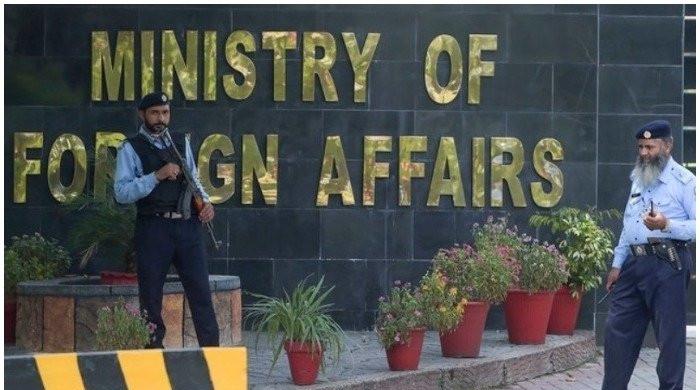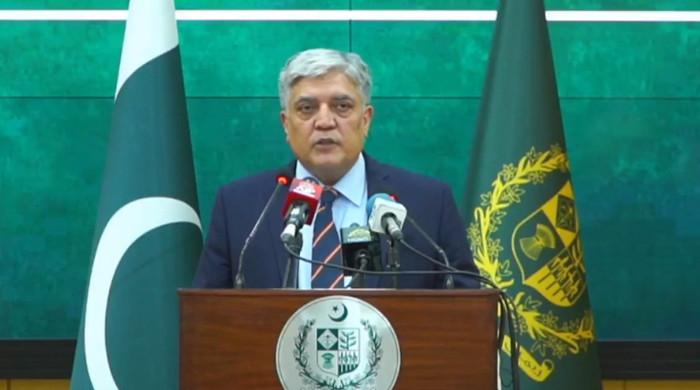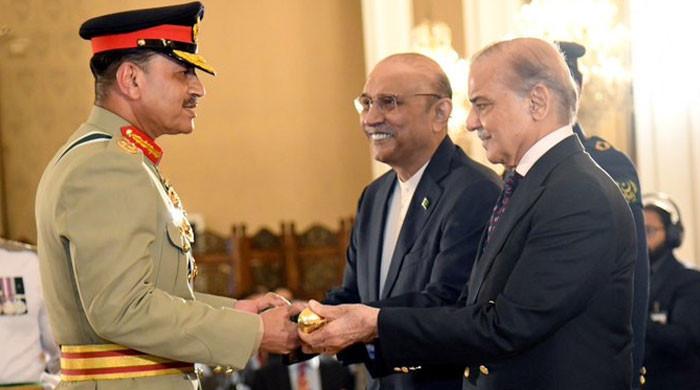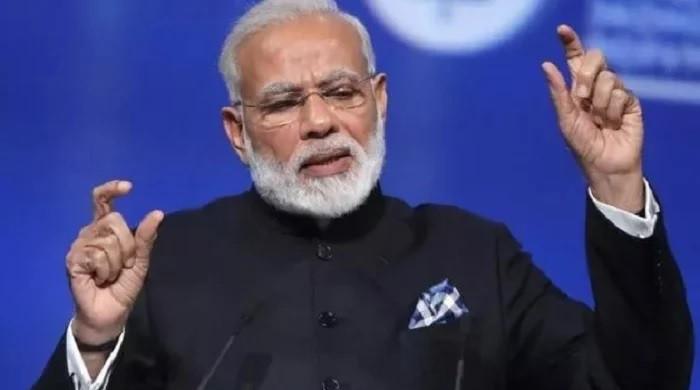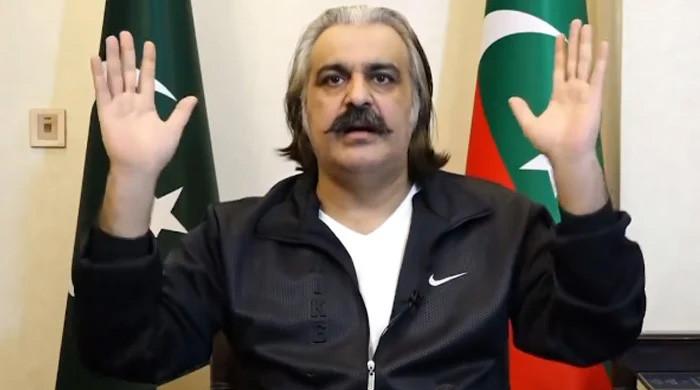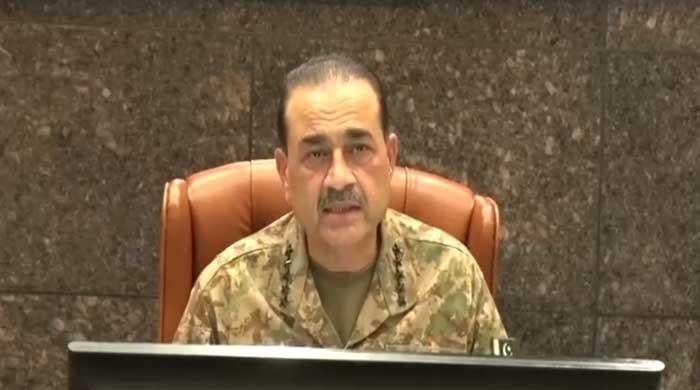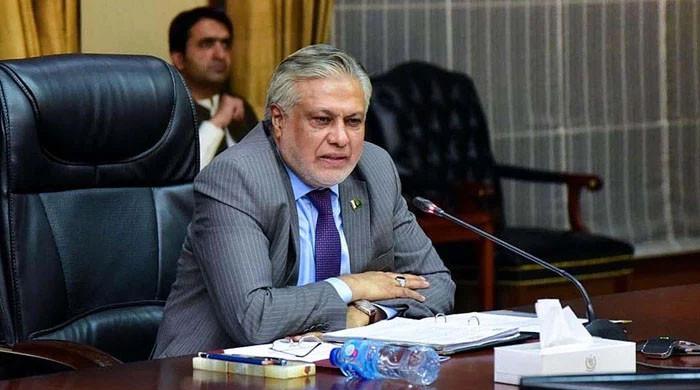Shehbaz Sharif: Expectations and limitations
Shehbaz is here to stay as PM without any trouble for at least year, unless something dangerous takes place
January 03, 2025
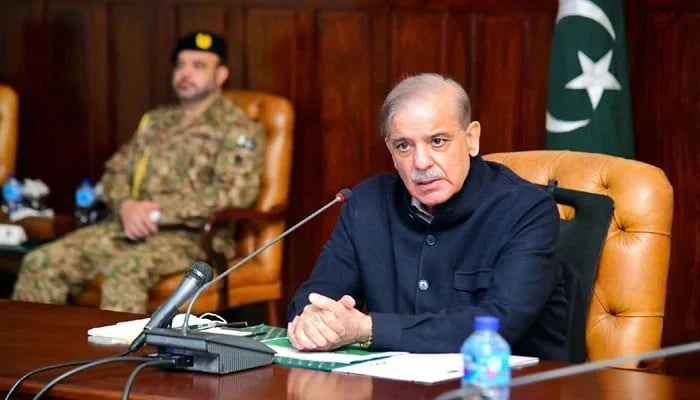
The word ‘Shehbaz’ literally means a high flying bird. Therefore, the launch of a five-year economic programme with the meaningful title of ‘Uraan Pakistan’ speaks volumes about Shehbaz’s desire to make Pakistan fly high in the economic field.
Another famous Urdu slogan carrying the incumbent prime minister’s name is ‘Shehbaz Karey Parwaz’, which means Shehbaz is a high flier.
Ever since assuming power as prime minister, Shehbaz has been flying very low and with utmost caution. But Uraan is his first initiative which carries an aggressive political and public narrative. Before that, he used to focus on the nitty-gritties of management without touching the most sensitive topic in politics.
With the powerful military establishment on his back, Shehbaz has now started treading the path of politics. He must have taken this initiative after much preparation and background discussions.
The surprised presence of his chief minister niece, Maryam Nawaz Sharif, at the launch of the Uraan Pakistan programme clearly shows that it was an attempt to bridge the widening gulf between the two.
The family must have realised that the visible non-coordination between the Punjab and federal governments was now damaging the Pakistan Muslim League-Nawaz (PML-N) and the politics of the extended Sharif family. There were rumours of internal rifts within the family on the future leader’s name. But Maryam showing up at the Islamabad event along with her uncle indicates that during the recent marriage ceremony of her brother’s son, Zaid Hussain, some understanding must have been reached between Shehbaz and Maryam through their party supremo Nawaz Sharif. Therefore, things that were long pending due to the internal family rift, are expected to start moving.
The pending issue of the extension of the federal cabinet, it appears, has been resolved too, in a closed door family meeting.
But the most important part of Prime Minister Shehbaz Sharif’s speech at the launch ceremony of the Uraan Pakistan Programme, was about the political role of the army. He thanked Chief of Army Staff (COAS) Gen Asim Munir for his unprecedented cooperation, but couldn’t forget to mention his past experiences of military intervention in politics that led Pakistan to serious economic crises.
Prime Minister Shahbaz Sharif is lucky that he is viewed as a hardworking prime minister who is sincerely trying to bring the country back on the economic track. He is also appreciated for being accommodating and having a deep understanding of the system and its working. He has shown a big heart and seems non-egoistical while finding a way between conflicting ideas. He is adept at carving out a space even where there is no space.
But ‘to err is human’ also applies to him. He takes lengthy meetings and is reluctant to make bold decisions. His failure to build a political narrative is also considered his negative point. It can be stated that Shehbaz Sharif has very few negatives, and a lot of positives. This leaves no room for the establishment to look out for his replacement for the time being. Shehbaz is here to stay as prime minister without any trouble for at least a year, unless something dangerous takes place.
The launching of his five-year Uraan Programme also assures that there is no immediate political, economic or security threat that can topple his government. It is an established fact that almost all political governments have been sent home by the powers that be but Shehbaz Sharif is so far lucky that the state structure is completely supporting him rather than making any effort to destabilise him.
There are two key reasons for this support: first, a joint front against Imran Khan and second Shehbaz Sharif’s general likeability among the elite of our establishment. Quite interestingly, Shehbaz Sharif is even preferred by the powers that be to his leader and brother Nawaz Sharif, who is dominating and takes a firm stand on important issues.
Shehbaz was nominated prime minister by Nawaz Sharif, while realising after the February 8 elections that his way is being blocked and hence the best pragmatic way is to nominate his brother as PM, besides getting his daughter Maryam nominated as CM Punjab. Though most people criticised Nawaz’s decisions, his closest confidantes say he made the best political deal, with a pragmatic approach, to stay in the power corridors rather than going into political oblivion.
Shehbaz Sharif is known for his speed and management. Everyone expects from good governance and speedy decisions from him. But as prime minister, his speed is far slower than his previous speed as Punjab chief minister. His style of management and governance is to find a team of hardworking bureaucrats and entrust them with full confidence and support. And he gets good results from them in return. Sometimes, he selects juniors for senior positions to get extra energy and interest to speed up his projects. But this trick is not working in the complex federal setup. Perhaps, a chief minister is more powerful in financial and administrative matters when compared with a prime minister. Therefore, his magic wand seems to be losing its effectiveness.
At the moment, Shehbaz Sharif is more amenable to people and politics than Nawaz Sharif. But he doesn’t consider himself to be a leader who seeks political power and guidance from his elder brother. In his whole political career, Shehbaz has never built any narrative, rather he has been following in the footsteps of his older brother.
But now, one can observe a major change in his thinking. Though he still has strong familial ties with his elder brother and is totally loyal to him, he dislikes the elder Sharif camp’s reservations about the top man and the interior minister.
At present, there is no contact between the Punjab CM and former Punjab CM Mohsin Naqvi. They haven’t met even once since Maryam became CM. On the other hand, Mohsin and Shehbaz enjoy the most cordial ties. This diverse trend shows different political views and attitudes. Therefore, it is important to see if these differences are ironed out or they are widened further to create a new political scenario.
The writer is the editor of Jang in Lahore, an anchor, and the executive director at Geo TV.
Disclaimer: The viewpoints expressed in this piece are the writer's own and don't necessarily reflect Geo.tv's editorial policy.
Originally published in The News




